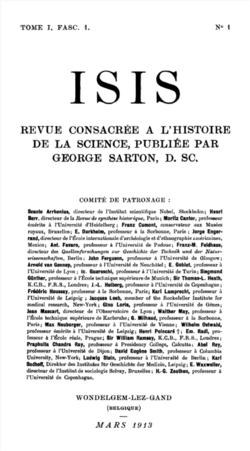Isis
Scientific journal, founded in 1912 by Georges Sarton.
Contents
[hide]History
In 1913, the first issue of Isis, the first journal devoted entirely to the history of science, rolled off the presses. It was named after the goddess Isis, who according to tradition was an alchemist and thus the first scientist. The Ghent historian of science Georges Sarton had founded the journal some time before, on 15 October 1912.
This was at a time when the history of science, after a revival at the end of the last centuru, was hardly receiving any attention within university education. Sarton had paid for the enterprise with his own funds and had written most of the contributions to the first issue himself. Together with his wife Mabel, he was also responsible for all editing and design work for the following issues. The editorial couple was also responsible for promotion and distribution. They sent the Isis programme to thousands of scientists all over the world - with a meagre return of about a hundred subscribers as a result.[1]
In his first issue Sarton made his intentions clear:
“Isis sera une revue de synthèse, une revue critique, une revue internationale et en quelque manière, une revue dogmatique. Isis sera l'organe de synthèse historique, dont tous les historiens de la science ressentent impérieusement le besoin, a mesure, d'une part, que leurs recherches deviennent plus nombreuses et plus étendues, d'autre part, que l'unité de la science s'affirme d’avantage. Notre but est de réunir sans cesse toutes les données historiques connues, d'établir aussi rapidement que possible la mise au point des méthodes nouvelles, de faire ressortir toujours par- dessus les tendances monographiques les resultats acquis par l'histoire de la science. Notre revue sera, si l'on veut, une revue générale des sciences, mais publiée a un point de vue historique, philosophique.”[2]
After four issues in Wondelgem, home of the Sartons, the printing moved to Ghent. The financial balance of the first year of publication turned red, but gradually the magazine became more successful. Parallel to the growth, the languages used in the magazine evolved from a combination of German, English, French and Italian to English and French and finally only English. With this, the magazine wanted to meet its international ambitions.
Georges Sarton, who had in the meantime emigrated to the United States, continued to pay for its publication with his own funds from his appointments at the Carnegie Institute in Washington and at Harvard University. Shortly after 1924 Isis became the official organ of the History of Science Society, which had just been founded by Sarton, and in 1941 the financial management also passed to this society. Sarton retained the editorship until 1951. In 1936, Sarton also created a more thematic counterpart to Isis with the annual thematic journal Osiris.
Isis exists to this day. It offers scientific articles on the history of science, medicine and technology, reviews and essays. A subscription to Isis is accompanied by a membership of the History of Science Society. Isis is printed by the University of Chicago Press.
External link
Bibliography
- Sarton, Georges-Alfred-Léon”, in: Biographie nationale, 38 (19), 713-733.
- Vanpaemel, Geert,"Bijlage Wetenschapsgeschiedenis in België", in: Halleux, Robert, Opsomer, Carmélia en Vandersmissen, Jan, Geschiedenis van de wetenschappen in België van de Oudheid tot 1815, Brussel, 1998, 429-430.
- Focus: 100 Volumes of Isis: The Vision of George Sarton, in: Isis, 100 (2009), nr. 1. (These articles are exceptionally publicly accessible)
Notes
- Jump up ↑ The Belgian king Albert I and the Belgian government (with five subscriptions) were on the list of early souscripteurs.
- Jump up ↑ “Isis will be a review of synthesis, a critical review, an international review and, in a way, a dogmatic review. Isis will be the organ of historical synthesis, which all historians of science urgently feel the need for, as their research becomes more numerous and more extensive, and as the unity of science becomes more asserted. Our aim is to constantly gather all known historical data, to establish as quickly as possible the development of new methods, to always bring out the results acquired by the history of science over and above monographic trends. Our journal will be, if you like, a general journal of science, but published from a historical, philosophical point of view.”
